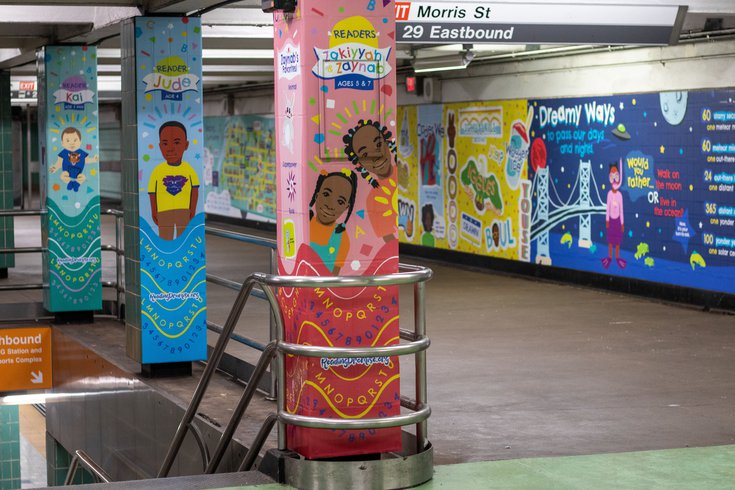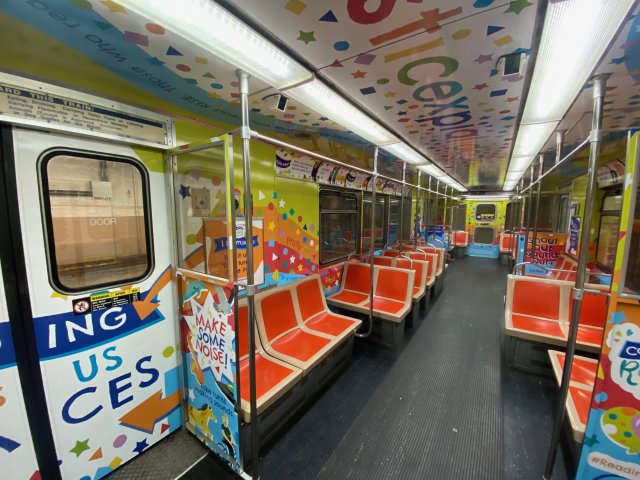
April 06, 2022
 Jenn Krout/Mighty Designers
Jenn Krout/Mighty Designers
SEPTA's Tasker-Morris subway station in South Philly has been transformed into a space to help engage children and families in reading.
Two out of every three children in Philadelphia are reading below their grade level by the time they reach fourth grade.
Childhood literacy advocates are seeking to improve that statistic by turning to an uncommon setting to help make reading more engaging for families — public transportation.
The "Come Aboard the Reading Promise" campaign was rolled out on Wednesday across SEPTA's subway and bus system as part of an effort to foster fun reading and learning experiences while riding on public transit.
The early literacy initiative will be visible at the Broad Street Line's Tasker-Morris station in South Philly and the Erie stop in North Philly, as well as 70 bus shelters, 36 buses, two subway cars and through hundreds of subway and rail signs across the city.
The campaign features large, vibrant artwork and interactive cues designed to spark discussions between adults and children that researchers say help support childhood reading skills.
Both subway stations will be outfitted with dispensers where free short stories will be available on-demand to allow families to read together while traveling. Families and children can create and submit stories, poems, illustrations, comic book strips and rap lyrics for the program.
More than 500 volunteer reading captains will distribute bags full of reading materials, including a word journal, to families waiting for and riding on buses citywide.
The campaign also features 24 characters, inspired by children from different Philly neighborhoods, who will encourage families to participate in riddles, tongue twisters, alphabet hunts, neighborhood maps, career explorations, poetry, songs and other activities.
The initiative offers playful games that appeal to children of different ages. Younger children can sound out words and make animal noises, while older learners can engage with "would you rather" questions.
Families are encouraged to share their experiences on social media and through QR prompts on campaign signage.
The program is being headed up by the Free Library of Philadelphia and Read by 4th, the city's early literacy collaborative. Campaign funding was provided by the William Penn Foundation.
Read by 4th is a citywide coalition of families and community leaders who seek to promote and protect every Philly child's right to read. The initiative is built upon the research-based five Reading Promises, which say that families are the key to a child's growth as a reader.
Advocates say that the public awareness campaign is designed to use everyday moments to develop stronger readers and foster learning in public spaces. Organizers also claim that it's the largest campaign of its kind in the U.S. to incorporate literacy efforts into public transit.
"Tens of thousands of students use SEPTA everyday, and we look forward to seeing this powerful educational endeavor help spark their creativity and further their achievements," SEPTA General Manager and CEO Leslie Richards said.
The "Come Aboard the Reading Promise" campaign will run through the spring.
Come aboard the reading promise! Lots to talk about with our young readers as we travel on @septa this spring! pic.twitter.com/Lq2nZl7RUH
— WilliamPennFdn (@WilliamPennFdn) April 6, 2022
The city's latest effort to bolster childhood literacy rates comes after roughly 72% of first graders scored either “below average” or “well-below average” on the School District of Philadelphia's reading assessments in the fall of 2020, according to Chalkbeat. Only 32% of third graders were reading at their grade level.
The report also found that only 31% of Black students, 23.5% of Latino children and 22% of Native American students in kindergarten through third grade are at or above their reading grade level. Likewise, only 20% of English learners, 26% of special education students and 30% of economically-disadvantaged children were reading at their grade level.
The National Association of Education Progress found in 2019 that only 17% of public school fourth graders in Philly read at or above "proficient" standards. Advocates argue that children who read below their grade level by the fourth grade are less likely to be set up for academic success.
Follow Pat & PhillyVoice on Twitter: @Pat_Ralph | @thePhillyVoice
Like us on Facebook: PhillyVoice
Add Pat's RSS feed to your feed reader
Have a news tip? Let us know.
